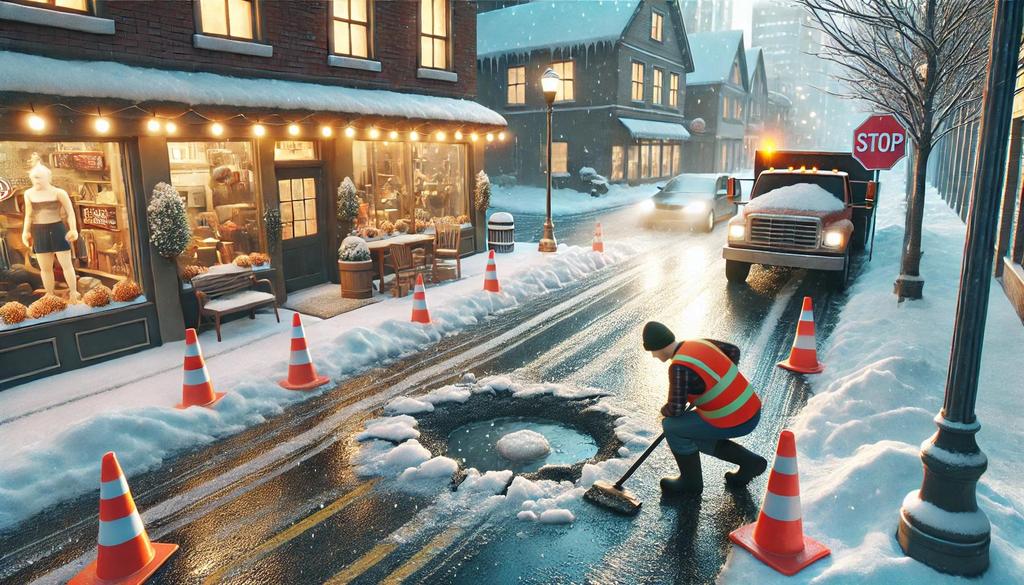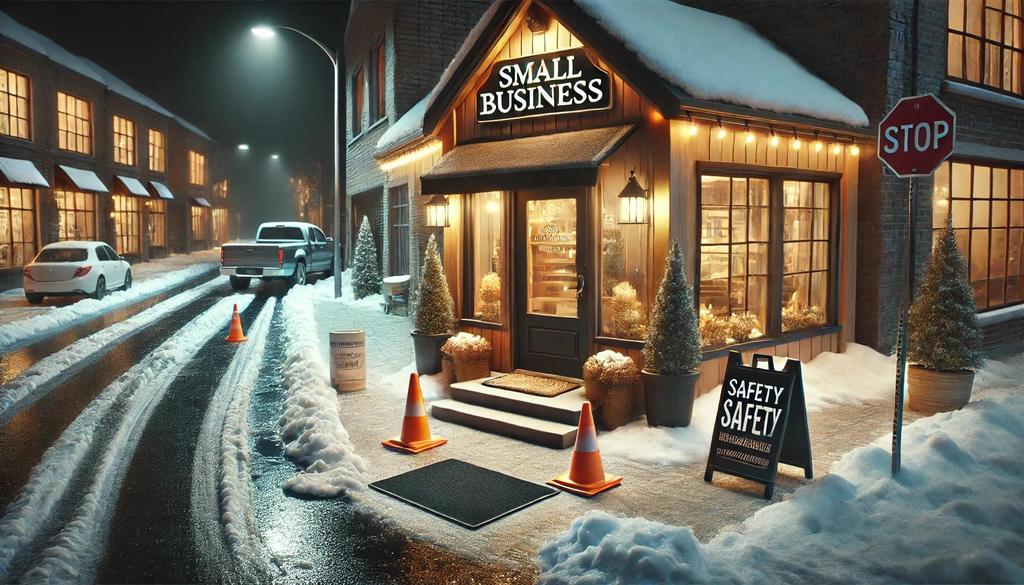As cold temperatures come, so do many hazards. Preparing for winter is an important step for a business to maintain safety on its property. Simple winterization and being ready to respond to snow and ice accumulation are key for businesses of all types. Winter safety can be the difference between enjoying a profitable holiday season and spending part of the season with insurance discussing a legal settlement.
Here are some winter safety tips for business owners to consider.
Create a Snow Removal Plan
Develop a plan to clear away snow. Assign a staff member the responsibility or hire a snow removal professional. Regular snow removal reduces the chance of a slip-and-fall.
Monitor Weather In Real Time
Throughout winter, monitor weather conditions in real time. Receive updates on snowstorms and freezing temperatures, giving you enough time to prepare and act.
Be Ready to Close During Severe Weather
Close early or delay opening during severe winter weather to ensure the safety of your employees and customers. The benefits far outweigh the disadvantages.
Use Magnesium Chloride for De-icing
Have ice on your business property? Bulk magnesium chloride melts ice quickly and works in lower temperatures than traditional salt. It’s a safe alternative to rock salt and works much the same way, minimizing the risk of falls on walkways and parking lots.
Insulate Pipes and Plumbing
Wrap any exposed pipes with foam insulation to prevent freezing. Frozen pipes could mean an eventual burst when the water expands, resulting in water damage and a repair cost.
Check Your Roof Before Winter Hits
Before the first snowfall, check your roofing for weak spots, repair damaged shingles, and fix the gutters if there are blockages or other issues to ensure water can drain properly as the snow melts.
Clear Snow Off Rooftops Quickly
Prevent snow accumulation on your roof. Snow can get heavy, especially with added rain and ice. Clear it away quickly to reduce the risk of a leak or structural failure.
Schedule an HVAC Inspection
Ensure your heating system is fully functional and efficient to warm your business space. Replace filters. Clean ductwork if it’s a concern. Ensure a clean system to keep your place of business warm.
Set Up Absorbent Door Mats
Place heavy-duty doormats at your entrance to catch as much snow, ice, water, and debris as possible when a person walks in. This will reduce slipping and protect your floor.

Stock Up on Winter Supplies
No matter what you use to help with winter de-icing, such as magnesium chloride, have plenty ready. Order in bulk and stock up to avoid running out during peak cold temperatures. Also, have your shovel, snowblower, and other winter supplies stocked and somewhere accessible.
Prepare a Winter Emergency Kit
Create a winter emergency kit that anticipates severe weather. Include multiple flashlights, extra batteries, first aid supplies, and blankets. An emergency kit will prepare you to respond if there is a power outage, an injury, or a winter-related event.
Test Your Fire Safety System
Inspect fire extinguishers and alarms to confirm they are operational. Review your fire evacuation plan. Ensure those pathways are always clear of snow and ice to facilitate a safe evacuation.
Provide Strong Exterior Lighting
Properly lighting walkways and parking areas can reduce the risk of a fall. This way, employees, customers, and guests can better identify hazards to avoid, such as icy patches.
Anchor Loose Items
As a business owner, you must ensure that signage, trash bins, outdoor furniture, and décor are anchored down. Unanchored materials and items can easily sustain damage from high winds during a winter storm.
Repair Your Parking Lot
If there are cracks or potholes where your customers park, winter will only bring about further deterioration, with ice and snow causing all sorts of damage. Make parking lot repairs before the winter season arrives.
Use Proper Signage Indoors
Mark wet floors with proper signage to further prevent accidents. Be sure to minimize unsafe areas as much as possible.
Confirm Your Inventory and Equipment Are Safe
Make sure to securely store your valuables, including product inventory and equipment. Temperature or moisture may damage some items, and frozen inventory can mean significant financial losses for some businesses.
Outline Winter Safety Protocols to Staff
Plan for interruptions to your business this winter because they will likely occur at some point. If remote work is possible, outline how that will be carried out to staff. Have a protocol in place for a temporary closure. Also, have a way to communicate with staff and customers so that business updates and information can be easily distributed during bad weather.

Prioritizing Winter Safety for Your Business
As the winter season approaches, business owners must take proactive measures to ensure the safety of their premises, employees, and customers. By implementing a comprehensive winter safety plan that includes snow removal strategies, real-time weather monitoring, and effective de-icing methods, you can minimize risks significantly. Additionally, regular maintenance such as checking roofs, insulating pipes, and repairing parking lots will further safeguard your business against winter-related damages.
Creating a winter emergency kit and keeping your fire safety systems in optimal condition will prepare your business for any unforeseen challenges. By also ensuring your property is well-lit and free of hazards, you enhance the safety of everyone who visits. Finally, open communication with your staff regarding winter protocols will promote a culture of safety, making it easier to navigate any weather-related disruptions. Prioritize these strategies to create a secure environment that supports both your business’s growth and the well-being of your community during the winter months.
This post was originally published on here







